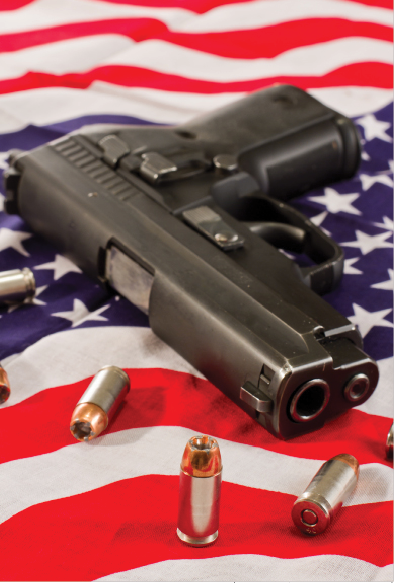Gun Control? Agree or Disagree
Published: November 4, 2015
 The debate has been long and hard, and it has seemingly gone nowhere. Liberals want them banned, conservatives want nothing of the sort. It keeps getting brought up, especially with the recent events that have transpired in Oregon and Tennessee. This debate is seemingly never ending, and it probably won’t end any time soon, as politicians continue to argue over the topic of gun control.
The debate has been long and hard, and it has seemingly gone nowhere. Liberals want them banned, conservatives want nothing of the sort. It keeps getting brought up, especially with the recent events that have transpired in Oregon and Tennessee. This debate is seemingly never ending, and it probably won’t end any time soon, as politicians continue to argue over the topic of gun control.
The topic of gun control has been under debate in Congress for several years, and only becomes more controversial everyday. With neither side willing to compromise, it seems to get worse. In a perfect world, gun control would work. But, as we all know, this world is far from perfect. There are many different factors that come into play, with the biggest factor being the ultimate law of the land, the Constitution.
Firstly, the federal government always needs to abide by the rules set out by the Constitution. With that being said, they must look into the Second Amendment, which states that “a well regulated militia” has the right to bear arms. This has been a main point coming from the left, as they point out that “a well regulated militia” is not an individual. This is rebuked by a large number of the founding fathers, such as George Mason and Thomas Jefferson, and other individuals who actually contributed to the writing of the Constitution.
Also, when considering a lawful ban of something, you have to look at the failures of the past and the present to see that a future ban won’t work. The clear answer is that it simply wouldn’t work. There are far too many variables that come into play. However, when someone commits a gun crime, they should face extreme charges that are much harsher than the charges that they face now.
Many gun control activists also like to point out the success of gun control in Australia. Though it is true that it has worked in Australia, one has to consider that there was far less gun violence than the U.S. before gun control was implemented in Australia. Also, the geography has to be considered in this, as the U.S. has two bordering countries while Australia is a massive island, so it’s easier to smuggle a weapon into the U.S., as a firearm smuggler would spend more money on transportation than they’d get for selling the weapon itself.
There also needs to be a consideration of who has the guns in the U.S. If a government official were to go to a law abiding citizen after gun control laws were passed, they’d likely give their firearms up. But would it work the same if a government official were to go to someone in a gang in Chicago and ask them to turn their guns in? No, they’d fight back. There would be no effective way to get guns off of the streets.
We also need to look at the failures of other countries that have implemented gun control. Venezuela is a prime example of this, as the South American country currently has the second highest homicide rate in the world. Do they implement gun control laws? Absolutely. In fact, they have some of the strictest gun control laws in the world. This is very clearly not working. This isn’t saying that if the U.S. were to ban firearms that they’d go up to the world’s capital of crime, but it’s saying that if there were to be a firearms ban, it wouldn’t change anything. There would still be the same problems we have today.
But to say that there isn’t anything that should be done about the problem is absurd. But, what should we do? Mandatory background checks is one partial solution, but as stated earlier, if someone wants a gun, they’re going to get one. Another way gun crime can be reduced is to abolish gun free zones and increase the number of armed guards in public areas. When a criminal sees a sign that says “This is a gun free zone,” do you really think that they’re just going to turn the other cheek and say “Oh well, guns aren’t allowed here?” No, what they’re going to see is that there are few, if any, people that can defend themselves and others around them, so the criminal can do as much damage as possible. According to Breibart, 92 percent of all shootings happen in gun free zones.
There’s virtually no way to end gun crimes. Yet, there are steps that need to be taken in order to try and prevent these crimes in the future, steps that wouldn’t be difficult to implement. Steps that would surely be effective, steps that would decrease the amount of mass shooting in the U.S. significantly. These are the steps that we must take as a nation to give the public further security from these crimes and the perpetrators. We should be giving the public more protection, certainly not less.






![2025 Snowcoming Pep Assembly [Photo Gallery]](https://FHNtoday.com/wp-content/uploads/2025/03/IMG_9969-300x200.jpg)
![2025 Snowcoming Dance [Photo Gallery]](https://FHNtoday.com/wp-content/uploads/2025/03/Snowco2025-Hmartin-3-300x200.jpg)
![Girls Soccer Holds Fourth Day Of Tryouts [Photo Gallery]](https://FHNtoday.com/wp-content/uploads/2025/03/AOrozco_Soccertryouts_3.6-20-300x200.jpg)

![Baseball Holds Their Last Day of Tryouts [Photo Gallery]](https://FHNtoday.com/wp-content/uploads/2025/03/baseball-tryouts-3.7-austin-griffin-11-300x200.jpg)


